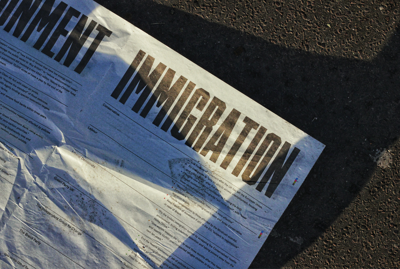
It is estimated that nearly 2.3 million immigrants living in the U.S. would be eligible under the DREAM Act, making up roughly one-fifth of the total population of undocumented immigrants in the U.S. Photo by Metin Ozer
April marks the first month of the official increase in the Deferred Action for Childhood Arrivals (DACA) application filing fee, from $495 to $555 if submitted online and $605 if submitted by paper. This is also the first time that fees differ depending on how they are filed.
For the past few weeks, DACA recipients, commonly known as Dreamers, have been receiving online reminders of the filling application fees increased by the U.S. Citizenship and Immigration Services (USCIS), which oversees and processes applications.
On January 31, 2024, USCIS published a final rule that, for the first time since 2016, adjusts certain immigration and naturalization benefit request fees, including DACA applications. “USCIS conducted a comprehensive biennial fee review and determined that current fees do not recover the full cost of providing adjudication and naturalization services. DHS is adjusting the fee schedule to fully recover costs and maintain adequate service,“ USCIS stated.
New prices for the renewal applications began taking effect on April 1, leaving many Dreamers worried about their inability to meet the new application fees, which in some cases can be more than an $110 increase. This is not the fee for attorneys or immigration lawyers that DACA applicants tend to rely on.
In 2023, the National Immigration Law Center (NILC) filed a public comment in response to the then-proposal fee that focused on how this decision would affect low-income immigrants, particularly those without lawful immigration status. NILC asked USCIS to reduce application fees to be reduced for low-income immigrants and provide opportunities for more fee exemptions and waivers, among other demands.
“Our economy has not fully recovered from the pandemic. High inflation has been found to disproportionately hurt low-income households. When inflation occurs, low-income households cannot significantly reduce their spending because they are already limiting their spending to necessities,” NILC’s public comment stated. “The proposed fee schedule would require low-income immigrants requesting immigration relief for themselves and/or their family members to make hard choices between applying for relief or buying necessities like groceries, gas, etc.”
Costs for on-paper filling are $50 more expensive, which is necessary for the many low-income DACA recipients who may not have access to the internet or internet service providers. NILC stated that this difference for applications filed electronically versus by mail favors applicants who are technologically savvy and/or have access to computers and the internet.
“41.9 percent of low-income immigrant households have no personal high-speed internet connection at home. While the efforts to improve online filings are appreciated, persons who do not have access should not be left behind… USCIS should continue to engage with legal service providers to determine how to improve electronic filings if it wishes to encourage its use,” NILC said.
DACA, which was initially introduced by former President Barack Obama in 2012, aimed to protect Dreamers by allowing them to live and work in the U.S. without fear of deportation but it did not grant them a path to citizenship. It is estimated that nearly 2.3 million immigrants living in the U.S. would be eligible under the DREAM Act, making up roughly one-fifth of the total population of undocumented immigrants in the U.S.
In September 2017, the Trump administration ordered to “execute a wind-down of the program,” as stated in the Memorandum on Rescission Of Deferred Action For Childhood Arrivals, which led the Department of Homeland Security (DHS) to stop accepting new applications; no first-time DACA applicants were permitted. Since then, DACA has been in constant flux.
Last September, a federal judge in the Southern District of Texas ruled DACA unlawful. Today, per the judge’s order, first-time DACA applications continue to be blocked and cannot be processed, denying millions of immigrants from legally working in this country. In addition, USCIS has been experiencing some delays in processing DACA applications.
On September 4, U.S. Senator Alex Padilla (D-Calif.), Chair of the Senate Judiciary Subcommittee on Immigration, Citizenship, and Border Safety, and U.S. Senate Majority Whip Dick Durbin (D-Ill.), along with 26 additional senators, sent a letter to U.S. Citizenship and Immigration Services Director (USCIS) Ur M. Jaddou, urging him to protect DACA recipients and process renewal applications in a timely manner.
According to the senators, many applicants for DACA renewal have reported waiting well over five months for their applications to be processed this fiscal year. USCIS median processing times doubled from fiscal year (FY) 2022 to FY 2023, and so far in FY 2024 (through February 28, 2024) are 90 percent longer than in FY 2023.
“The DACA program has allowed more than 834,000 Dreamers an opportunity to pursue higher education and meaningful careers while remaining in the only home they have ever known. We thank you for your efforts to fortify the DACA program through rulemaking and for the Department of Homeland Security’s defense of that rule in litigation,” wrote the Senators in the letter. “Despite these important efforts, DACA recipients face significant uncertainty given litigation challenging the DACA program and threats by presidential candidate Donald Trump to end the program. Delays in processing DACA renewals are adding to the instability and uncertainty that DACA recipients already face each day.”
The Senators cited various ways DACA recipients, their employers and their families are facing significant disruptions due to these processing delays. Senators urged USCIS to make a “focused effort” to reduce pending cases and processing times for DACA renewal applications.
In addition to DACA renewal applications, the cost of applying for Advance Parole will also increased from $575 to $630.
USCIS stated that with the final rule and increase in DACA applications, the agency will be able to cover their operating costs more fully and support the timely processing of new applications. “Unlike many other federal agencies, we are almost entirely fee-funded. About 96% of our funding is from filing fees, and only about 4% is from congressional appropriations,“ USCIS stated on its website.
Immigrant rights organizations like United We Dream, CHIRLA and Carecen advised DACA recipients to renew their work permits as soon as possible.











(0) comments
Welcome to the discussion.
Log In
Keep it Clean. Please avoid obscene, vulgar, lewd, racist or sexually-oriented language.
PLEASE TURN OFF YOUR CAPS LOCK.
Don't Threaten. Threats of harming another person will not be tolerated.
Be Truthful. Don't knowingly lie about anyone or anything.
Be Nice. No racism, sexism or any sort of -ism that is degrading to another person.
Be Proactive. Use the 'Report' link on each comment to let us know of abusive posts.
Share with Us. We'd love to hear eyewitness accounts, the history behind an article.